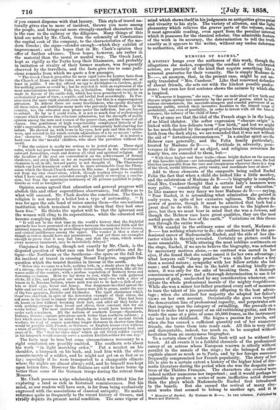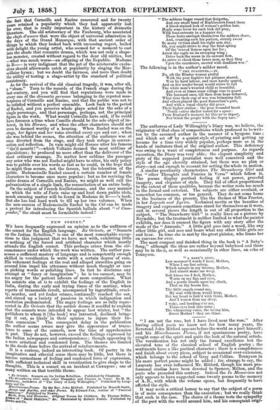MEMOIRS OF RACHEL. * A MYSTERY hangs over the authoress of
this work, thotatthecet allegations she makes, respecting the conduct of the cele
actress, are precisely of the kind that require something. like a personal guarantee for their veracity. She is simply Madame de
B—, an anonym, that, in the present case, might be not un- aptly translated " Mrs. Candour.' Like that renowned defender of absent friends, she sets out with the kindest possible profes- sions ; but even her first sentence shows the animus by which she is inspired.
" Whenever it happens," she says, "that an individual of low birth and obscure origin springs into notoriety by the power of genius, aided by for- tuitous circumstances, the anecdote-mongers and scandal purveyors of an insatiate public, stretch their inventive faculties to the utmost verge of probability, and even of possibility, in order to invest with all the hues of romance, the infancy of the child of fame."
We at once see that the idol of the French stage is in the hands of no blind idolator. The softer expression "obscure origin" is linked with the less delicate term "low birth," and lest we might
be too much dazzled by the aspect of genius breaking triumphantly forth from the dark abyss, we are reminded that it was not without the aid of " fortuitous circumstances." In a similar spirit are the Hebrew race generally, and the Felix family particularly, treated by Madame de B—. Fortitude in adversity, perse- verance in the pursuit of an object, and religious reverence for family ties, are conceded to them, but-
" With those higher and finer traits—those bright dashes on the canvass of this Israelite tableau—are intermingled meaner and baser ones, the foul blotches inseparable from the race and conspicuous wherever there is a drop of the blood, sordid littleness, petty vanity, and inordinate love of show.
Add to these elements of the composite being called Rachel Felix the fact that when a child she looked like a little monkey, and the substratum of Madame de B—'s biography is complete. Good Mrs. Candour thought that a certain lady's manners were very polite, " considering that she never had any education." In like manner we may fancy we hear Madame de B--- saying, " Poor Rachel, it is astonishing what admiration she gained in early years, in spite of her excessive ugliness. This shows the power of genius, though it must be admitted that luck had a great deal to do with it. She was rapacious to the highest de- gree, but then we must bear in mind that she was a Jewess, and though the Hebrew race have great qualities, they are the most sordid people on the face of the earth." Variations on this theme run through the entire work. With scandal in the ordinary sense of the word, Madame de B— has nothing whatever to do ; she confines herself to the pm- fessional career of Mademoiselle Rachel, and the side of her cha- racter which is thereby revealed. Certainly no picture could be more unamiable. While uttering the most sublime sentiments on the stage, Rachel, if we axe to believe the biography, was actuated by mercenary motives alone, —no contract was sacred in her eyes, if she found that she could cancel it for her own advantage ; what lawyers call " sharp practice " was with her rather a first than a second nature ; sympathy with her fellow artists she had none ; and though she was in the habit of making kindly pro- mises, it was only for the sake of breaking them. A thorough consciousness of power, and a thorough determination to use it for purposes of gain, unchecked by any consideration whatever, con- stitute the whole professional morale of the mighty tragedienne. While she was a minor her father practised every sort of meanness to turn the talent of his precocious offspring to the best advan- tage ; when she attained her majority she adopted her father's views on her own account. Occasionally she goes even beyond the demarcation line of professional rapacity, and perpetrates acts that impinge upon the category of swindling. She prevails on a friend to make her a present of an old rubbishing guitar, and then vends the same at a price of some 50,000 francs, as the instrument she used in her childhood. She feigns a passion for jewels, and when she has coaxed a sufficient quantity out of her numerous friends, she turns them into ready cash. All this is very dirty and disreputable, indeed, too much so, to be accepted without hesitation from an anonymous biographer.
To a certain class of readers the book will not be without in- terest. At all events it is a faithful chronicle of the professional career of an actress whose European renown is utterly without parallel in the annals of the stage ; for she belonged to other capitals almost as much as to Paris, and by her foreign successes• frequentlyi compromised her French popularity. The story of her life s also to a certain extent a history of the higher kind of dra- matic literature during the period when she was the despotic mis- tress of the Theitre Francais. The characters she created were indeed neither numerous nor important ; and it would perhaps be impossible to produce a series of more ineffective acted dramas than the plays which Mademoiselle Rachel first introduced to the boards. But she caused the revival of many clas- sical works that seemed to belong to another age, and it is • Memoirs of Rachel. By Madame de B—. In two volumes. Fuldiahsdbi Murat and Blackett. the fact that Corneille and Racine recovered and for twenty years retained a popularity which they had apparently lost for ever, that is really important in the history of dramatic literature. The old aristocracy of the Faubourg, who associated the chefs d'ceuvre that were the object of universal admiration in the days of the Grand Monarque, with that ancient order of things to which they looked back with unceasing regret, hailed with delight the young artist, who seemed for a moment to cast into the shade that romantic drama, which was not only a shape- less monster, created without regard to the dear old unities, but —what was much worse—an offspring of the Republic. Madame de B— is very indignant that the pet of the aristocratic exclu- sives should afterwards catch at popularity by singing the Mar- seillaise hymn; but we doubt the fairness, and more than doubt the utility of testing a stage-artist by the standard of political consistency. As for the revival of the old classical tragedy, it was, after all, a " sham." Turn to the records of the French stage during the last century, and you will find that reputations were made in every one of the dramatis personce belonging to the reputed mas- terpieces of Corneille and Racine, and that the public was not to be satisfied without a perfect ensemble. Look back to the period of Rachel, and you perceive whole plays acted for the sake of a single personage, and that personage, perhaps, not the principal figure in the work. What would Corneille have said, if he could have foreseen a time when Camille should be the sole object of in- terest, in his Horace, and when the other characters should not even be deemed worthy of a hearing. When Rachel was on the stage, her figure and her voice rivetted every eye and ear ; when she was behind the scenes, the attention of the audience was at once diverted from the stage, and they took refuge in conver- sation and reflection. In vain might old Horace utter his famous " Qu'il mounit ! "—which Voltaire deemed the most sublime of ejaculations; he produced no more effect than the deliverer of the most ordinary message. No matter how sublime the passages any actor who was not Rachel might have to utter, his only policy was to gabble over his words as fast as he could, in the hope that he might thus secure, not the favour, but the toleration of the public. Mademoiselle Rachel caused a certain number of female characters to become once more popular ; but as for reviving the entire drama of Corneille and Racine, we might as well call the galvanization of a single limb, the resuscitation of an entire body. . On the subject of French feuilletonisme, and the easy manner m which the wits of Paris raise up and hurl down public idols, much amusing matter will be found. in Madame de B—'s book. But she has had hard work to fill up her two volumes. When the non-success of Mademoiselle Rachel in the Cid can be made a pretext for introducing. the Spanish ballads about " el Cam- peador," the strait must be formidable indeed !



































 Previous page
Previous page